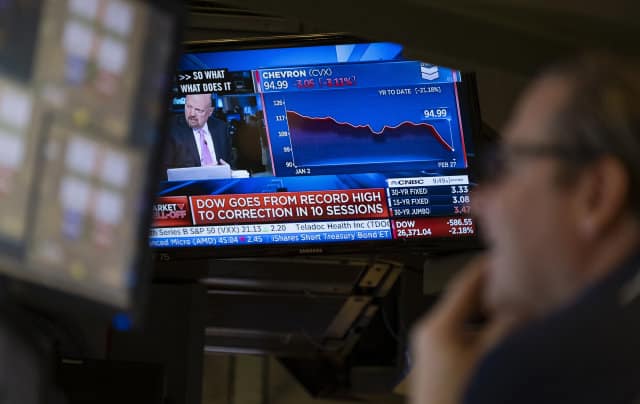Stocks Suffer Worst Week Since Financial Crisis Amid Coronavirus Fears

Stocks tumbled for a seventh consecutive day on Friday, with the S&P 500 index falling about 0.8 percent, bringing its loss for the week to about 11.5 percent. It was the worst weekly decline for stocks since the 2008 financial crisis. In early October that year, the S&P 500 fell about 18 percent.
The Dow Jones industrial average fell more than 1 percent on Friday.
The sell-off was fueled mostly by worry that measures to contain the virus would hamper corporate profits and economic growth, and fears that the outbreak could get worse. The selling has in a matter of days dragged stock benchmarks around the world into a correction — a drop of 10 percent or more that is taken as a measure of extreme pessimism.
In Europe, Britain’s FTSE 100 fell more than 3 percent and the Dax in Germany fell more than 4 percent. In Asia, the Nikkei 225 in Japan closed down 3.7 percent, the KOSPI in South Korea dropped 3.3 percent, and the Shanghai Composite in China dropped 3.7 percent.
Here’s how the major indexes around the world fared this week:
- S&P 500 in United States: ⬇️ 11%
- Dow Jones in United States: ⬇️ 12%
- FTSE 100 in Britain: ⬇️ 11%
- DAX in Germany: ⬇️ 12%
- KOSPI in South Korea: ⬇️ 8%
- Hang Seng Index in Hong Kong: ⬇️ 4%
- Nikkei 225 in Japan: ⬇️10%
The Fed says it is willing to act if the outbreak worsens.
The Federal Reserve chair, Jerome H. Powell, moved to soothe investors on Friday, issuing a statement reaffirming that the central bank will use its tools and “act as appropriate to support the economy.”
While Mr. Powell said the “fundamentals of the U.S. economy remain strong,” he also noted that “the coronavirus poses evolving risks to economic activity” and said the Fed “is closely monitoring developments and their implications for the economic outlook.”
The chair’s fellow officials had earlier signaled a willingness to cut interest rates if the coronavirus outbreak worsens, laying out a scenario in which the central bank might respond as infections and quarantines spread globally.
Scott Minerd, chief investment officer of Guggenheim Investments, said that officials at the Federal Reserve Bank of New York had reached out on Thursday to ask whether he was seeing any signs of pressure or deterioration in funding markets, which are critical to Wall Street’s functioning.
While he did not see funding problems as of yet, Mr. Minerd said that the Fed may have to pressure banks to continue to provide financing or encourage use of the discount window if the situation worsens.
He said the U.S. economy would likely be tipped into a recession and stocks prices could fall by another 20 to 30 percent if the outbreak becomes a pandemic.
Source: NY Times




